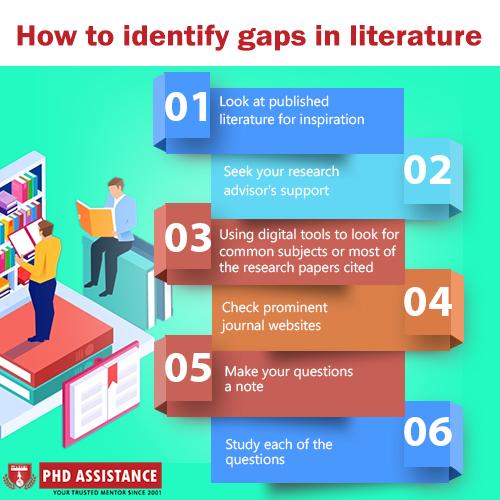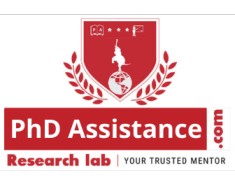How to identify the research gap while writing a PhD dissertation literature review?
In-brief:
- Research Gap is a Problem, which is not addressed correctly.
- It may be due to lack of sufficient information to support the claim and literature gap, which are the missing or incomplete piece of data in the research literature that is not explored or ventured.
- PhD Assistance gives you tips to Identify Research Gaps in the Literature Review for writing a PhD dissertation.

Introduction
A Research Gap is a Topic or field for which insufficient data restrict the ability to conclude a research question. If we are looking for a research issue, what is the healthiest beverage for humans? You can discover multiple studies and potential answers to the questions. Research gap identification eventually makes way for new and exciting research.
How to Identify Research Gaps?
Identifying Research Gaps may seem difficult or even impossible, given the potential of current research. I do not have time to read every public health paper that is written. Similarly, there’s no time for you guys to read every article. But how do you find a gap in your research?
In different disciplines, there are various techniques, but we can reduce most of them to a few moves, which are:
- Identify your main motivating question/issue
- Identify key words linked to this problem
- Review the Literature, search for these keywords and recognize suitable publications
- Review the literature cited by the prominent publications in the above phase.
- Identify problems not discussed by the literature concerning your vital motivating problem
It is the last step we all find the most difficult. It can be hard to find out what an article does not claim. I like to keep a list of notes of biased or contradictory facts. You can also track what authors write as “directions for future studies,” which can also guide us to the current gaps.
How to identify gaps in the literature
You may wonder what the best way to come up with some innovative research questions would be. Although there is no well-defined method for identifying a void in established information, you can help locate it with your curiosity, ingenuity, imagination, and judgment.
- Look at published literature for inspiration
Read books and posts about the subjects you want the most. It allows you to understand the depth of researchers’ work in your field and Ask it all.’ It would be best if you requested yourself questions such as:
- What is the relevance of this study to my research or the broader field?
- How does it help me formulate my research questions in this article?
- Will further clarity need the statement of the author?
- What problems or the author has not answered questions?
- Is there a particular viewpoint I should take into account?
- What other variables may have affected the findings?
It would help if you concentrated on the Introduction section when reading Research Papers. The authors clarify their research subject’s significance and the holes they have found and attempted to fill in their research. Also, look at the directions or recommendations that the writers have made for more study as that could be highly encouraging for PhD Literature Review Gap Identification.
To learn more about the advancements and developments in science over the years in the field of your liking, read meta-analyses and review articles. It will allow you to get acquainted with the issues studied in the past and trending questions that you find curious about specific subjects.

- Seek your research advisor’s support
To generate ideas for research, address the problems and concerns in your field with your research advisor. It will help you identify your research area or even identify your method’s errors by articulating your ideas and learning what others think and work. If you believe that working on a topic will be necessary, you should speak to your advisor about it.
- Using digital tools to look for common subjects or most of the research papers cited
You should use digital resources to familiarize yourself with the trending queries in your area, as they can bar time and help you cast a broader net in your quest for a research void. To know which topics are considered significant, websites such as Critical Science Indicator that classify the most cited papers in a field and emerging branches, prominent authors, publications and countries in that field can be beneficial. You can also use Google Trends to study more about the current questions relevant to your study area.
- Check prominent journal websites
There is always a segment called ‘main concepts’ on influential journals where experts in a region highlight the core ideas in that field. Reading through this chapter will help you gain a lot of knowledge and also create new ideas. Also, it would be best if you observed through these papers’ reference section, as it can lead you to essential resources on the Topic.
- Make your questions a note
It is a good idea to remember reading any written literature and all the problems that cross your mind. You can map the query to the resource it is centred on, if possible. To maintain a record, you can use tables, charts, photographs, or software. In the long run, this will benefit you when you turn your idea into a research issue or even when you Write Your Manuscript.
- Study each of the questions
You must perform extensive research on them until you have a list of questions that could be discussed. What does that imply? Learn more about each of your doubts or inquiries. Find out whether there were related questions from other researchers and if they have found answers to them. It will help you prevent work duplication.
Your research project is something you will spend a lot of time on, so make sure it stimulates your enthusiasm and interest. When finalizing an unprecedented research concept, make sure that you consider the period available to complete the project and other essential considerations, such as the availability of funding, resources, and facilities. Your research project is something you will spend a lot of time on, so make sure it stimulates your enthusiasm and interest. When finalizing an unprecedented research concept, make sure that you consider the period available to complete the project and other essential considerations, such as the availability of funding, resources, and facilities.
Conclusion
It would Help If You Used the suggestions given in this blog to find out what works for you because there is no particular method to pick out outstanding or fascinating Research Problems. Keep reading and asking questions before the specific issue you’ve been looking for is found!
Reference
- Denney, A. S., & Tewksbury, R. (2013). How to write a literature review. Journal of criminal justice education, 24(2), 218-234.
- Randolph, J. (2009). A guide to writing the dissertation literature review. Practical Assessment, Research, and Evaluation, 14(1), 13.
- Dissanayake, D. M. N. S. W. (2013). Research, research gap and the research problem.



